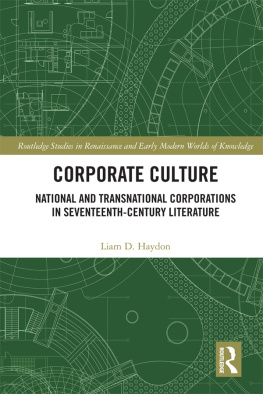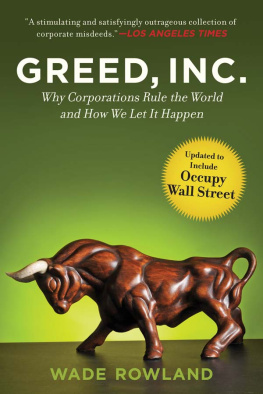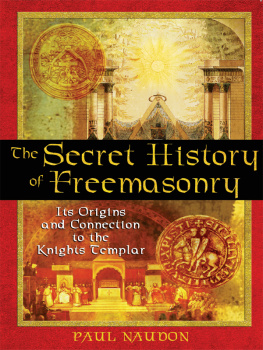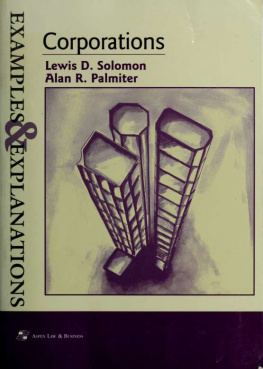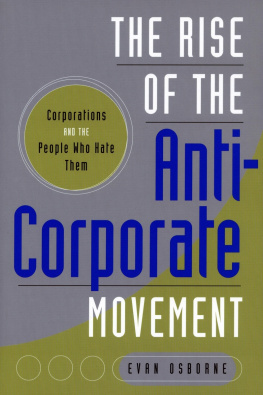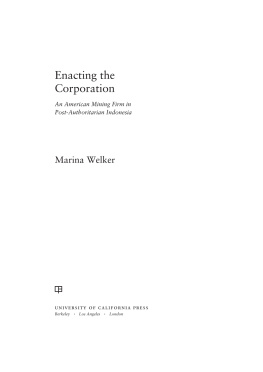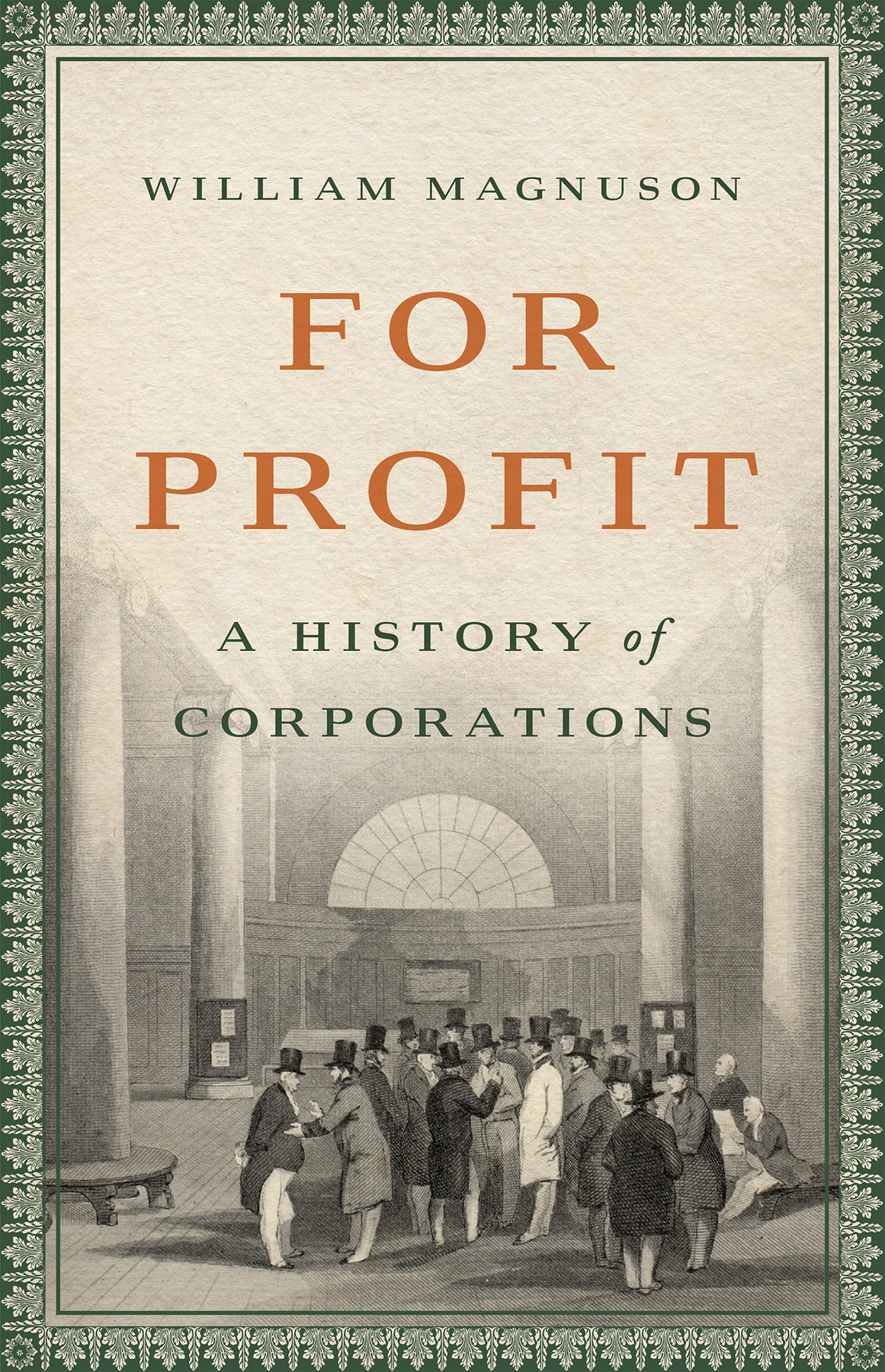
Copyright 2022 by William Magnuson
Cover design by Ann Kirchner
Cover images The Stapleton Collection / Bridgeman Images; Daboost / Shutterstock.com; VadimZosimov / Shutterstock.com
Cover copyright 2022 by Hachette Book Group, Inc.
Hachette Book Group supports the right to free expression and the value of copyright. The purpose of copyright is to encourage writers and artists to produce the creative works that enrich our culture.
The scanning, uploading, and distribution of this book without permission is a theft of the authors intellectual property. If you would like permission to use material from the book (other than for review purposes), please contact permissions@hbgusa.com. Thank you for your support of the authors rights.
Basic Books
Hachette Book Group
1290 Avenue of the Americas, New York, NY 10104
www.basicbooks.com
First Edition: November 2022
Published by Basic Books, an imprint of Perseus Books, LLC, a subsidiary of Hachette Book Group, Inc. The Basic Books name and logo is a trademark of the Hachette Book Group.
The Hachette Speakers Bureau provides a wide range of authors for speaking events. To find out more, go to www.hachettespeakersbureau.com or call (866) 376-6591.
The publisher is not responsible for websites (or their content) that are not owned by the publisher.
Library of Congress Control Number: 2022940721
ISBNs: 9781541601567 (hardcover), 9781541601581 (ebook)
E3-20220912-JV-NF-ORI
For Jane
I N N ICHOLAS N ICKLEBY, C HARLES D ICKENS TELLS THE TALE OF A joint stock company. It is, he assures us, of vast national importance. Its business will contribute to the wealth, the happiness, the comfort, the liberty, the very existence of a free and great people. Members of Parliament announce their support. Crowds of investors show up to attend its first meeting. There are, in short, great expectations for the United Metropolitan Improved Hot Muffin and Crumpet Baking and Punctual Delivery Company.
Why the very name will get the shares up to a premium, one of the directors exclaims.
Standing on a stage before a meeting of assembled investors, the directors begin their pitch by denouncing the great evils that beset the current muffin trade. One director tells of a visit he made to the houses of the poor in London. He had found them destitute of the slightest vestige of a muffin, which there appeared too much reason to believe some of these indigent persons did not taste from years end to years end. Another director, a grievous gentleman of semi-clerical appearance, stands up to detail the sufferings of the so-called muffin boys, the children who walk the streets of London hawking muffins to the public. It seemed that the unhappy youths were nightly turned out into the wet streets at the most inclement periods of the year, to wander about, in darkness and rainor it might be hail or snowfor hours together, without shelter, food, or warmth; and let the public never forget upon the latter point, that while the muffins were provided with warm clothing and blankets, the boys were wholly unprovided for, and left to their own miserable resources. (Shame!) The speeches bring tears to the eyes of the ladies in the crowd.
Fortunately, the directors continue, the United Metropolitan has a plan to solve this melancholy state of affairs. First, the directors promise, they will prohibit, under heavy penalties, all private muffin trading. Second, they will supply the public with muffins of first quality at reduced prices. Finally, they will render the purchase of muffins and crumpets compulsory upon all classes of the community. The directors announce that a bill to this purpose has been introduced into Parliament.
The directors words have a profound effect on the crowd. All the speeches put together did exactly what they were intended to do, and established in the hearers minds that there was no speculation so promising, or at the same time so praiseworthy, as the United Metropolitan Improved Hot Muffin and Crumpet Baking and Punctual Delivery Company. One director whispers to a colleague that the speeches have caused the value of the companys shares to rise 25 percent. The directors adjourn the assembly to much cheering and acclamation and promptly head to lunch (the cost of which they expense to the company).
The tale of the United Metropolitan Improved Hot Muffin and Crumpet Baking and Punctual Delivery Company presents to us, in a remarkably compact format, the great critiques of the age of capitalism. Unscrupulous managers, corrupt politicians, gullible investors, domineering monopoliesthey are all here. And it is clear where Dickenss sympathies lie. One of the companys directors happens to be the novels primary villain, Ralph Nickleby. But Dickens does not care to expand on philosophy. He is less interested in constructing a grand theory of capitalism than in painting a picture of the people who live inside its wallsthe great and the forgotten, the rich and the poor, the owners and the workers. It is no coincidence that, to paint this portrait, he chose to turn his attentions to a corporation. Only by looking inside the corporation, by examining its workings and exposing its methods, could Dickens show the great forces unleashed by capitalism. Dickens knew that the story of capitalism is, in reality, the story of corporations.
T HIS BOOK TELLS THE HISTORY OF CORPORATIONS AND THE PEOPLE behind them, from the stockholders who fund them to the executives who manage them to the employees who keep them running. As such, it is a human story, about a diverse group of merchants, bankers, and investors who have over time come to craft the landscape of our modern economy. It is filled with tales of the rich, the powerful, and the ingenious, but also of the conniving, the fraudulent, and the vicious. We will learn about slave traders and robber barons, but also scientists and innovators. We will range from the halls of Roman palaces to the assembly lines of Detroit factories. We will learn about how businesses work and how they fail, about what makes a great leader and what makes a poor one.
If there is one constant in the history of corporations, it is that they have always and ever exerted an outsized influence on world events. In ancient Rome, corporations helped transform the Roman army into the most efficient fighting force known to man. In Renaissance Florence, they oversaw a flourishing of artistic genius that has never been rivaled. More recently, they have ushered in the era of Big Tech, with smartphones and the internet transforming the way we interact with the world. The role of corporations in these developments, of course, has not always been positive. Roman publicans became renowned for their greed and corruption, leading to their eternal association with sinners in the Bible. The Medici Bank in Florence was denounced for engaging in usury, and the Dominican friar Savonarola led bonfires of the vanities to campaign against their vices. Big Tech is under assault on any number of fronts, from its privacy practices to its monopoly positions to its handling of free speech. Sometimes corporations are the hero. Sometimes they are the villain. But they are always on the stage.
This book is divided into eight chapters, each devoted to a single corporation. Corporations may be the basic building block of capitalism. But they have not always looked and acted as they do today. In the Roman Republic, corporations operated within an agrarian economy and dealt exclusively in government contracts for things like road building and tax collecting. In Elizabethan England, corporations catered to a mercantilist economy, devoted themselves to exploration and trading, and regularly engaged in actions that can only be described as piracy. Today, corporations compete in a complex global economy, provide a bewildering array of goods and services, and have access to unprecedented amounts of capital. Over the course of the book, we will explore how this evolution took place.


